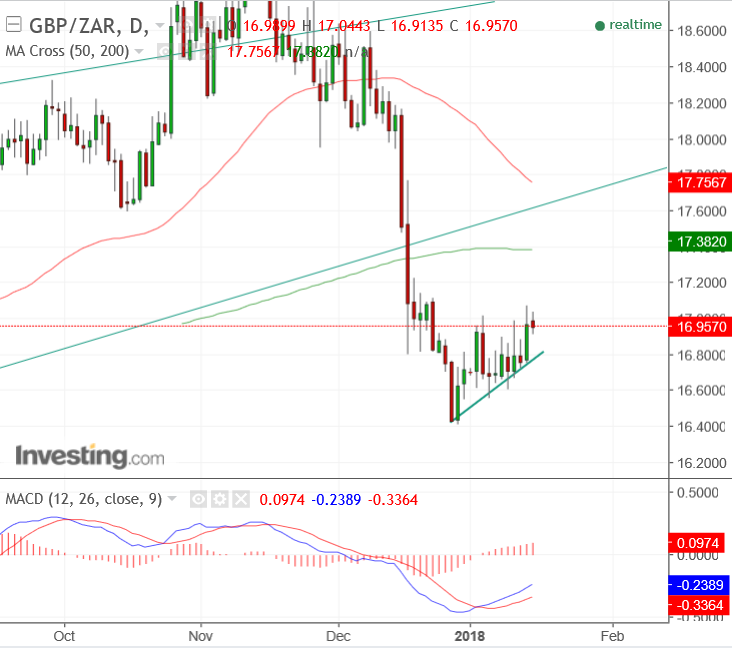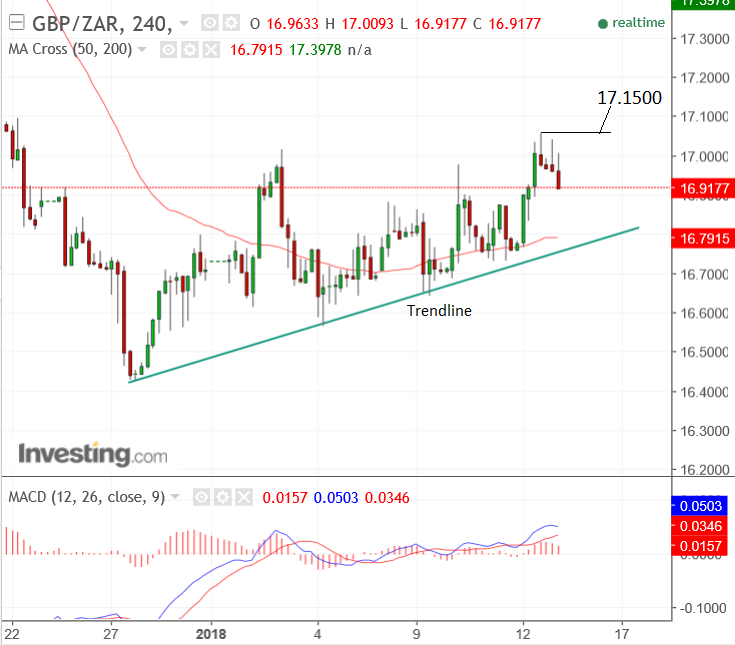Pound-to-Rand Rate's Week Ahead Forecast

The Pound-to-Rand exchange rate is expected to continue struggling higher in the coming week, according to the charts.
GBP/ZAR is rising in a short-term uptrend which we expect to extend, however, panning out to longer-term timeframes we note how the broader trend remains bearish so gains are ultimately liable to be fleeting.
The daily chart below shows how the pair has broken down through the lower line of a channel and the 200-day moving average (MA) and fallen all the way down to a low of about 16.40 at the end of 2017, from where it made an unconvincing recovery.

The very short-term uptrend which has been unfolding since the late 2017 lows is clearer on the four-hour chart below, which shows the recovery in more detail as it climbs steadily higher making higher highs and lows as it goes.
In the absence of any contradictory signs - and as long as the trendline does not break - we expect the short-term uptrend to extend higher, with a break above the 17.0605 highs probably leading to a continuation up to a target at 17.1500.

Get up to 5% more foreign exchange by using a specialist provider to get closer to the real market rate and avoid the gaping spreads charged by your bank when providing currency. Learn more here.
Data and Events for the South African Rand
The main release in the coming week for the South African Rand is the meeting of the South African Reserve Bank (SARB) on Thursday, January 18 at 13.00 GMT.
At the meeting, the monetary policy committee will decide at what level to set interest rates.
Most analysts believe they will probably leave them unchanged at their present 6.75% level.
"Rate cuts to spur this growth are possible but this week is probably too early for the SARB to act: a lot of the political risks that the SARB worried about last year have eased and the Rand has strengthened nicely, but caution is still due given the problems with the budget, the high risks of another rating downgrade that spurs WGBI outflows, and the surge in the oil price to US$70/bbl," Says John Cairns, Analyst at Rand Merchant Bank (RMB).
Given that expectations are for interest rates to remain unchanged, any changes to interest rates would therefore likely move the market. A rate rise would, on margin, be highly supportive of the currency, while a surprise rate cut would undermine ZAR.
Data and Events for the Pound
The key data release for the Pound is inflation data out at 09.30 on Tuesday, January 16, which is forecast to ease to 3.0% compared to the same time in the previous year, from 3.1% in November.
Core inflation is likewise forecast to ease to 2.6% from 2.7% previously.
A higher-than-forecast print will probably strengthen the Pound as it will increase pressure on the MPC to increase interest rates in order to try and limit future inflation levels.
Higher interest rates are positive for currencies because they draw greater inflows of foreign capital with the promise of higher returns.
Analysts at TD Securities are marginally more hawkish, expecting inflation to remain at 3.1% and not fall back in December.
"Our 3.1% forecast for headline CPI is just above the top of the BoE's target range and well above the BoE's forecast of 2.7% from the Nov Inflation Report. Core CPI should soften by a tenth, but the big jump in energy prices into the end of the year will keep the headline well-supported," say TD Securities in a note to clients ahead of the new week.
Friday sees the release of retail sales data which often moves Sterling as it gives an insight into the health of the UK consumer.
The UK economy is heavily reliant on the retail sector and should data beat expectations we would expect some positive response in Sterling.
The bar is actually set quite low for a positive surprise as monthly retail sales for December is forecast to show a decline of 0.6%, a slowing from the previous month's growth of 1.1%.
Monday sees the Bank of England (BOE) in focus with a speech from Silvana Tenreyo (above), the new member of the Bank's Monetary Policy Committee (MPC), at 18.15 GMT on Monday, January 15.
Not long after she first joined the BOE back in October 2017 Tenreyro said she would want to see UK employment improve and wages rise further before advocating raising interest rates - a move which would be bullish for the Pound.
"Silvana Tenreyro, an external MPC member, said she would need to see more evidence of the elimination of slack in the labour market before voting for a rate rise," says Chris Giles, Economics Editor at the Financial Times.
Yet the unemployment rate has not fallen since she said those comments and instead has stayed the same at 4.3% since September 2017, so assuming this is still her view, we do not expect her to talk up interest rates on Monday, which is on margin negative for Sterling.
(Image courtesy of Tradingeconomics.com)
Get up to 5% more foreign exchange by using a specialist provider to get closer to the real market rate and avoid the gaping spreads charged by your bank when providing currency. Learn more here.
